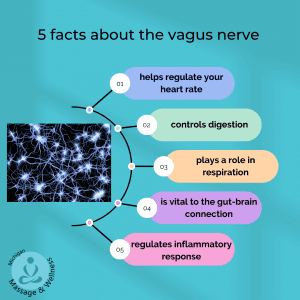Can’t relax? Maybe it’s your vagus nerve.
 There seems to be a lot of buzz around the vagus nerve these days, but a lot of people don’t know what it is or the critical role it plays in the day to day. Don’t worry, we’ve got you covered so settle in and take a journey on the wonder and complexity of one of the most fascinating pieces of the human body. (Seriously, it does a lot!)
There seems to be a lot of buzz around the vagus nerve these days, but a lot of people don’t know what it is or the critical role it plays in the day to day. Don’t worry, we’ve got you covered so settle in and take a journey on the wonder and complexity of one of the most fascinating pieces of the human body. (Seriously, it does a lot!)
First off, what is the vagus nerve anyway?
Also known as the tenth cranial nerve, the vagus nerve is not only the longest nerve in the body, but it’s an essential part of the autonomic nervous system (ANS) and is responsible for controlling critical functions such as digestion, heart rate, respiration and more. The word ‘vagus’ is derived from the Latin word for “wandering”, because well, it wanders through the body.
Some functions of the vagus nerve include:
- Regulation of your heart rate as it helps to maintain the balance between the sympathetic (fight or flight) and parasympathetic (rest and digest) nervous system. By stimulating the vagus nerve (more on how to do that below), it can slow down the heart rate, getting you into parasympathetic, while inhibiting it can increase it. Think of the whole ‘being chased by a bear’ scenario that hopefully none of us will ever encounter. That sympathetic/fight/flight response is going to kick in as your body surges with those stress hormones to get you running faster than Usain Bolt. After you’re in the clear and you know that bear is long gone, you want to shift into that parasympathetic state so you can rest up before your next confrontation. Or a more modern day example might be when you have to go give a speech to hundreds (or thousands) of people. Palms sweaty, chest tight, heart rate quickens. Doing some simple breathing exercises can help calm you down so you don’t walk out of there with that deer in headlights look.
- Aids in digestion. You know the old “eyes are bigger than the stomach” addage? Well, your vagus nerve helps control those feelings by stimulating the production of stomach acid and digestive enzymes and regulates the release of bile from the gallbladder to aid in fat digestion. So stop inhaling your lunch at your desk in 3 minutes because you have another call to get on. Take your time, enjoy your meal, and let your brain catch up to your palate.
- It can improve your respiration as it helps to control the rate and depth of respiration by promoting the exchange of oxygen in the lungs. It can also influence reflex actions such as coughing and sneezing. So if you’ve been told that you’re a shallow breather or you’re like me and sometimes are standing at the sink washing dishes and suddenly realize that you’re not breathing at all, it might be worth it to practice some basic diaphragmatic breathing.
- Helps control the gut-brain connection. Again, coming back to the eyes/stomach dilemma, when your vagus nerve is ‘on’ it can transmit sensory information back and forth between your brain and your gut, which is crucial in regulating appetite, mood and overall well-being. So next time you find yourself eating your feelings or you can’t stop reaching for the cookies, take a quick inventory on any stressors that are happening in your life.
- Regulates inflammatory response. When activated, the vagus nerve releases neurotransmitters that can help to mitigate excessive inflammation and may help with autoimmune conditions and inflammation-related disorders.
So the next time you find yourself over eating, or not being able to have a restful nights sleep, or you wake up and things hurt but you don’t know why, look at the big picture. Have you been under any extra stress? Have you been taking care of yourself by moving regularly, eating a balanced meal once in a while, getting regular bodywork sessions, managing your stress levels, practicing breathing, mindfulness, meditation or just simply putting your phone on Do Not Disturb for a few hours and staying away from the news for a couple of days? If not, it might be time to make some small changes that can add up to some big results.
Or if you’re like me and just want someone else to do something for once, book a session with us! Try the 15 minute stress/anxiety MPS session or the ultra relaxing 90 minute Escape and let us get you on the right track.
In Good Hands,
Rebecca Tamm, LMT